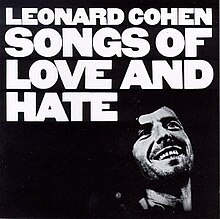Songs of Love and Hate
| Songs of Love and Hate | ||||
|---|---|---|---|---|
 |
||||
| Studio album by Leonard Cohen | ||||
| Released | March 19, 1971 | |||
| Recorded | September 22–26, 1970 | |||
| Studio | Columbia Studio A, Nashville (Second mix) August 31, 1970 at Isle of Wight, Trident Studios, London (First mix) |
|||
| Genre | Folk, folk rock | |||
| Length | 44:21 | |||
| Label | Columbia | |||
| Producer | Bob Johnston | |||
| Leonard Cohen chronology | ||||
|
||||
| Professional ratings | |
|---|---|
| Review scores | |
| Source | Rating |
| AllMusic | |
| BBC | Favorable |
| Pitchfork | 8.2/10 |
| Robert Christgau | A– |
| Rolling Stone | |
| Sputnik Music | |
| Q | |
| Uncut | |
Songs of Love and Hate is the third studio album by Canadian singer-songwriter Leonard Cohen. Produced by Bob Johnston, the album was released on March 19, 1971, through Columbia Records.
Cohen reunited with producer Bob Johnston, who was at the helm for the singer's previous album Songs From a Room, and also brought back guitarist Ron Cornelius, who acted as leader of Cohen's new crew of backing musicians, christened The Army. The album was mainly recorded in Columbia Studio A in Nashville September 22–26, 1970. "Sing Another Song, Boys" was recorded at the Isle of Wight Festival on August 30, 1970. Further recording took place at Trident Studios in London. The album title is descriptive, outlining its main themes, and it features several of Cohen's most famous compositions, including "Joan of Arc," "Avalanche," and "Famous Blue Raincoat." In the 1996 book Various Positions, Cohen biographer Ira Nadel confirms that many of the songs were from an earlier period, with "Joan of Arc" having been written at the Chelsea in New York; "Avalanche" and "Dress Rehearsal Rag" dated from earlier years; and "Love Calls You by Your Name" was a minor rewrite of an unpublished 1967 song called "Love Tries to Call You by Your Name." In 1991, Cohen revealed to Throat Culture magazine that the recording of his third album had been a difficult time for him because "absolutely everything was beginning to fall apart around me: my spirit, my intentions, my will. So I went into a deep and long depression."
"Joan of Arc" is constructed mainly as a dialogue between Joan of Arc and the fire which is consuming her as she burns at the stake, after having been found guilty of heresy (in 1431). In the song, Joan says that she is "tired of the war" and tells how she would rather be wearing a white wedding dress (one of the charges against her was that she dressed as a man). Joan's surrender to the fire, as its bride, may also be seen as a symbol of her religious fervor and commitment. In a 1988 interview with John McKenna of RTE Ireland, Cohen said of "Joan of Arc," "I was thinking more of this sense of a destiny that human beings have and how they meet and marry their destiny...I don't want to suggest in that song that what she really wanted to be was a housewife. What I mean to say is that as lonely and as solitudinous as she was she had to meet and be embraced by her destiny...seen from the point of view of the woman's movement she really does stand for something stunningly original and courageous." In his 2010 book Leonard Cohen: A Remarkable Life, biographer Anthony Reynolds quotes Cohen explaining that "Famous Blue Raincoat" is about "A man writing a letter to a man who has had an affair with his wife," but, on a more prosaic level, Cohen is also quoted saying that the tune is related to his own attire: "I had a blue raincoat. It was Burberry. It had lots of various fixtures on it...It always resided in my memory as some glamorous possibility that I never realized..." In the book Songwriters on Songwriting, Cohen confessed to being unsatisfied with the composition:
...
Wikipedia
